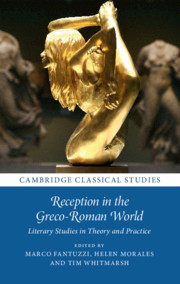Book contents
- Reception in the Greco-Roman World
- Cambridge Classical Studies
- Reception in the Greco-Roman World
- Copyright page
- Dedication
- Contents
- Figures
- Notes on Contributors
- Acknowledgements
- Abbreviations
- Altered States: Cultural Pluralism and Psychosis in Ancient Literary Receptions
- Part I Archaic and Classical Poetics
- Part II Classical Philosophy and Rhetoric, and Their Reception
- Part III Hellenistic and Roman Poetics
- Part IV Multimedia and Intercultural Receptions in the Second Sophistic and Beyond
- Chapter 12 Received into Dance? Parthenius’ Erōtika Pathēmata in the Pantomime Idiom
- Chapter 13 Sappho in Pieces
- Chapter 14 Hesiodic Rhapsody: The Sibylline Oracles
- Chapter 15 Homer and the Precarity of Tradition: Can Jesus Be Achilles?
- References
- Index
Chapter 12 - Received into Dance? Parthenius’ Erōtika Pathēmata in the Pantomime Idiom
from Part IV - Multimedia and Intercultural Receptions in the Second Sophistic and Beyond
Published online by Cambridge University Press: 05 June 2021
- Reception in the Greco-Roman World
- Cambridge Classical Studies
- Reception in the Greco-Roman World
- Copyright page
- Dedication
- Contents
- Figures
- Notes on Contributors
- Acknowledgements
- Abbreviations
- Altered States: Cultural Pluralism and Psychosis in Ancient Literary Receptions
- Part I Archaic and Classical Poetics
- Part II Classical Philosophy and Rhetoric, and Their Reception
- Part III Hellenistic and Roman Poetics
- Part IV Multimedia and Intercultural Receptions in the Second Sophistic and Beyond
- Chapter 12 Received into Dance? Parthenius’ Erōtika Pathēmata in the Pantomime Idiom
- Chapter 13 Sappho in Pieces
- Chapter 14 Hesiodic Rhapsody: The Sibylline Oracles
- Chapter 15 Homer and the Precarity of Tradition: Can Jesus Be Achilles?
- References
- Index
Summary
This chapter focuses on the Sufferings in Love, the mythological collection of racy stories by Parthenius of Nicaea. It proposes that Parthenius’ ‘little notebook’ was eminently ‘good to think with’ in the context of the various dance idioms evolving in first century BC Rome, particularly in the period of vigorous miscegenation and experimentation leading up to the flamboyant, official entrance of pantomime dancing into Roman public life. Although we are unlikely ever to know whether any performances wrought around the material assembled by Parthenius actually materialized in the twilight of the Roman Republic, the possibility should act as a warning against any uncritical assumption that stylish Hellenistic/ neoteric work and corporeal, performance dialects could not have much in common. The chapter uses the example of Parthenius’ putative afterlife ‘in the flesh’ to make a wider case about the need of writing the non-verbal, kinaesthetic, and thoroughly embodied medium that is the art of dance into the bigger narrative of reception in antiquity. ‘Reception into dance’ is neither inferior nor futile but immensely liberating, empowering, and potentially pathbreaking
Keywords
- Type
- Chapter
- Information
- Reception in the Greco-Roman WorldLiterary Studies in Theory and Practice, pp. 293 - 318Publisher: Cambridge University PressPrint publication year: 2021



